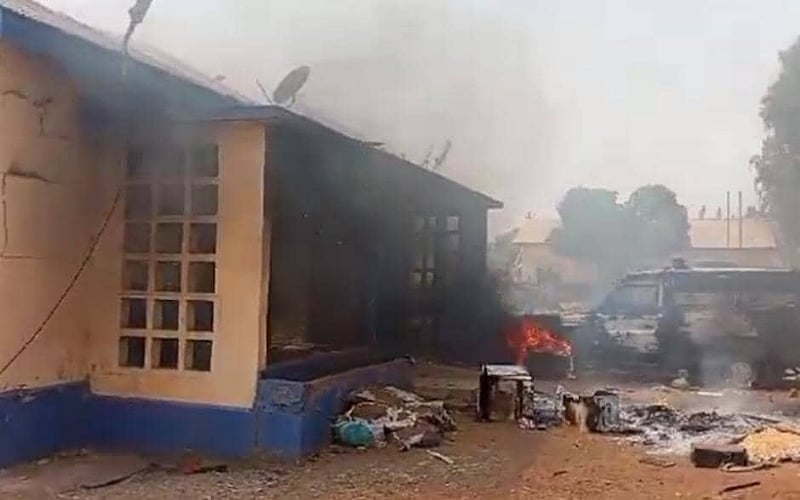The eruption of violence in Ejura, Ashanti Region, on January 11, 2025, paints a stark picture of simmering tensions between the police and the Zongo community, ignited by the death of a young man in police custody. The incident began with the arrest of the deceased for allegedly purchasing a stolen phone. He voluntarily presented himself to the police, agreeing to return the following morning to cooperate with the investigation. This seemingly cooperative approach underscores the unexpected and tragic turn of events that followed. The discovery of his lifeless body within the confines of the police cell served as the catalyst for the ensuing chaos. The community’s trust in the police was irrevocably shattered, giving way to raw grief, anger, and a deep sense of injustice. This initial spark quickly ignited a raging fire of unrest within the Zongo community.
The police’s handling of the deceased’s remains further exacerbated the volatile situation. The decision to transfer the body to the Mampong morgue without prior consultation or notification of the family added fuel to the already burning flames of community outrage. This perceived disregard for cultural sensitivities and basic human decency amplified the perception of police indifference and disrespect, further alienating the grieving community. The act was interpreted not merely as a procedural misstep but as a deliberate affront, deepening the chasm of mistrust between the police and the Zongo community. It served as a potent symbol of the perceived disregard for their rights and concerns, pushing the already tense situation to the brink of explosion.
News of the death and the perceived insensitive handling of the body spread rapidly through the tightly knit Zongo community, galvanizing its members into action. A spontaneous protest march descended upon the local police station, the epicenter of their grief and anger. The demonstration, initially fueled by demands for justice and answers, quickly escalated into a violent confrontation. The escalating tension mirrored the community’s escalating sense of betrayal and powerlessness. The police station, a symbol of authority and law enforcement, became the target of their collective rage.
The pent-up frustration and fury of the Zongo youth manifested in a destructive outburst. They set the police station and its accompanying quarters ablaze, the flames reflecting the intensity of their anger and the depth of their despair. This act of arson was not merely a destructive rampage; it represented a symbolic rejection of the authority they perceived as having wronged them. The fire became a visible manifestation of their burning sense of injustice and their demand for accountability. The escalating violence signaled a breakdown in the relationship between the community and the police, a relationship already strained by existing tensions.
The intervention of armed soldiers marked a critical turning point in the unfolding chaos. Deployed to quell the unrest and restore order, the soldiers resorted to firing warning shots to disperse the increasingly agitated crowd. This show of force, while potentially necessary to prevent further escalation, also risked exacerbating the situation. The presence of armed military personnel underscored the gravity of the situation and the perceived inability of the police to manage the crisis. While aimed at restoring order, the intervention risked further alienating the Zongo community and solidifying their perception of being marginalized and unheard.
The aftermath of the Ejura violence leaves behind a smoldering landscape of destruction and unanswered questions. The incident has thrown into sharp relief the urgent need for improved relations between the police and the community, particularly within marginalized groups like the Zongo community. The tragic death of the young man in custody and the subsequent violent reaction demand a thorough and transparent investigation. Accountability must be at the heart of this investigation, addressing not only the immediate circumstances of the death but also the broader systemic issues that contributed to the breakdown of trust. The Ejura incident serves as a stark reminder of the fragility of peace and the importance of addressing underlying grievances before they erupt into violence. It highlights the need for a more just and equitable system that respects the rights and dignity of all citizens. The path forward requires open dialogue, meaningful engagement, and a commitment to building a stronger, more inclusive community where such tragedies are prevented, not repeated.


